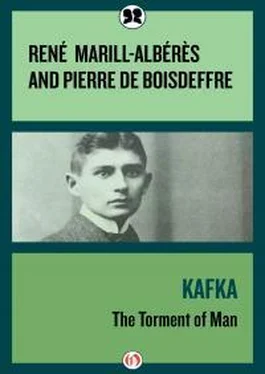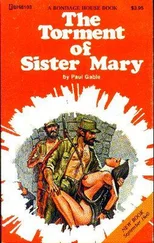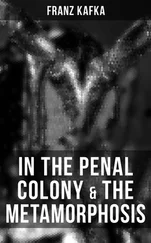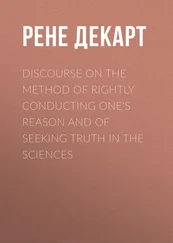Even in Prague he was not completely cut off from other writers of his time, for he associated with members of the BarKochba circle and with men like Buber, Pick, Baum, and Franz Werfel. His friends were struck by “the deep sureness” on which his wit was based, the constant originality of his words (all the more striking because they were not forced) untarnished by banality.
In his presence one felt directly that true greatness defies change, even when every appearance speaks against it—that the noble kernel of the world remains untouched by all the abuses and perversions that exist. He did not say this, it is only very rarely that he speaks about things like that, and when he does it is only hesitatingly, in fleeting images that often sound almost like jokes.
But his whole behavior, down to the smallest detail, even if you only watch the way he brushes his hair, is based on the belief that there is, as a premise taken for granted without discussion, a mode of life which is right, thorough, clean, and in complete conformity with nature. But to find it, to arrive at it—that is the difficulty. Deny this enormous difficulty—that he is far from doing … He knows that one cannot take a step without getting into complications, without stumbling. And yet there is deep confidence that the inner excellence will mature. 25
Max Brod’s idealized portrait is in all probability tinged with optimism. Still, Kafka did not admit that he had been overpowered by life even though he was approaching the age of thirty. He felt that everything in him was ready for literary creation, which would be “a divine solution,” “a real entry into life.” Then he could escape from the office in which, each day, he had “to force a piece of writing for his office out of himself as if he were tearing a piece of flesh out of his own body.” 26
But in 1912, when he was beginning The Trial, The Stoker and The Metamorphosis , “absorbed in his work,” he felt an aura of peace descend upon him. His life, “monotonous, empty, misspent,” suddenly acquired meaning and justification. Did art bring him the salvation to which he aspired? One thing is certain: while he hoped to find happiness at last with F. B., 27he plunged into his creative work with the zeal of a preacher and the patience of an artist. From September to the end of November, 1912, “Kafka ecstatically devoted his nights” to the writing of Amerika and “The Metamorphosis.”
NOTES
1. Max Brod, Franz Kafka, eine Biographie (Frankfort: Fischer, 1951; first published in 1937).
This basic work has been translated into English by G. Humphreys Roberts and Richard Winston (New York; Schocken Books Inc., 1947, 1960).—Quotations, unless otherwise identified, are based on the French translation by Hélène Zylberger (Paris: Gallimard, 1945). [Trans.]
2. Charles Péguy, L’Argent .
3. Cf. Contre Sainte-Beuve (Gallimard).
4. Unless otherwise noted, all epigraphs are from the writings of Kafka.
5. Two of the boys died at an early age, with the result that Kafka’s only companions were his three sisters.
6. Max Brod, Franz Kafka (English edition), p. 5.
7. The letter was never sent to his father.
8. “Letter to His Father,” in the French collection Préparatifs de noce à la campagne (Paris: Gallimard, 1957).
9. Ibid . Translation follows Heinz Politzer’s Franz Kafka, Parable and Paradox (Ithaca, New York: Cornell University Press, 1962), p. 10 [Trans.].
10. Ibid .
11. Ibid .
12. Ibid .
13. Charles Moeller, Littérature du XX eSiècle et Christianisme , III.
14. Kafka nevertheless knew brief periods of happiness which he re called nostalgically: When his father shared in the suffering of one of the family causing love and kindness finally to appear on his face, “there were tears of happiness, and I weep now again as I write this.” He also recalls his father’s “particularly engaging way of smiling, silently, peacefully, benevolently,” but adds that in the end the only result of these remissions was to increase his feeling of guilt.
15. Quoted by Charles Moeller, op. cit .
16. “Letter to His Father.”
17. Max Brod, Franz Kafka (English edition), pp. 41-42.
18. Letters to Milena .
19. Worth noting here, for the first time, is the spiritual and moral bond between these two destinies. Though separated by hundreds of miles and three-quarters of a century, Kierkegaard and Kafka are linked by so many common traits that they might pass for spiritual twins.
Each sprang from a middle-class family, well-to-do but only by virtue of recent successes. Each was crushed by the weight of a father’s smug superiority and tried to escape by means of a marriage which was both indispensable and impossible ; moreover, neither of them dared to conclude a marriage. The literary output and lives of few men are more instructive than theirs concerning the mysterious links between the inner life and creation. With Kierkegaard and Kafka the power of retrenchment which can be exercised by a work during the period of its gestation in a man whom it gradually isolates from the outer world, the singularity which it develops in him, sacrifice which it imposes on all the passions in the name of a single passion reached an intensity almost unparalleled in literature; it is as if each of them, in order to achieve total communion with a creation to which he sacrificed his life, had to imprison himself in a state of loneliness comparable to that of the mystics. Cf. Pierre de Boisdeffre, Solitude et Communion chez Kierkegaard et chez Kafka, Mélanges Georges Jamati (Paris: Editions du Centre National de la Recherche Scientifique, 1956).
20. Cf. chap. iii, “Kafka and the Prospect of Marriage.”
21. Franz Kafka, op. cit .
22. Ibid . (English edition), p. 51.
23. Ibid . (English edition), p. 93.
24. Kafka worked first for a private insurance company ( Assicurazioni Generali ), then took a semigovernmental post in Prague (Work men’s Accident Insurance Company).
25. Max Brod, op. cit .
26. Ibid . (English edition), p. 88.
27. Felice Bauer. See Heinz Politzer, op. cit., pp. 48 ff, [Trans.]
II
KAFKA’S TORMENT
THE POST-NATURALIST GENERATION
(1906-1913)
You don’t have to leave the house. Remain at your table and listen. Don’t even listen, just wait. Don’t even wait, be absolutely silent and alone. The world will come to you and let you take off its mask, it can’t refuse . 1
Between 1902 and 1910 Kafka began to write. Writing was for him an imperious need born of loneliness. “The fact of being alone has power over me, unfailingly. My inner being dissolves (superficially for the moment) and prepares to let something more profound emerge.” 2
There is no question about the subject of his first writings, nor even about their intention. From the outset they convey an inner truth impervious to ordinary logic; they express something deeper than consciousness and compel rational consciousness to remain silent.
Nor is there anything exceptional about this conception of art in Germanic literature. Narration without any apparent logic, motivated by an inner force, had also been a necessity to the German Romantics. Jean Paul Richter defined it in his Poetics and illustrated it in Princess Brambilla and Stories of the Dog Post . In defining “the absurd” in Kafka’s writings, one must guard against confusing truly Kafkan absurdity—the personal torment of the individual or the mythology of The Trial and The Castle —with a certain poetic inconsistency in narration which belongs generally to the Romantic tale—the Märchen . Only Nerval made use of this genre in France, but in the German-speaking lands—after Novalis, Tieck, Hoffmann, and Jean Paul—its characteristics and imaginative qualities are familiar to everyone, in spite of its neglect during the realist period.
Читать дальше












